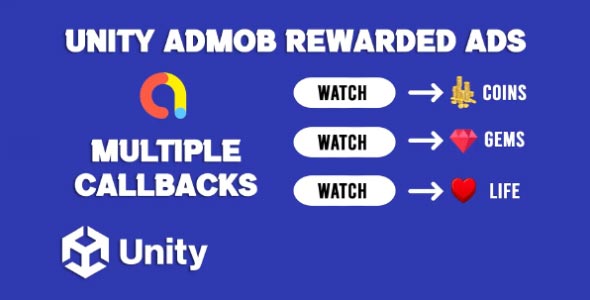Unity AdMob Rewarded Ads Multiple Callbacks is a critical topic for developers looking to monetize their mobile games effectively. Rewarded ads are a smart move—especially when players are willing to exchange their time for in-game rewards. But if you’re using Unity AdMob rewarded ads, handling multiple callbacks can be tricky. Developers often face issues like duplicate rewards, missed events, or inconsistent user experiences due to improper callback management.
In this guide, we’ll break down how to correctly implement and manage AdMob rewarded ads multiple callbacks in Unity, avoid common pitfalls, and ensure your ad events are triggered reliably and only once.
Why Callbacks Matter In Rewarded Ads Unity
Rewarded ads work because of a simple but powerful exchange: users watch a full video ad in return for an in-game benefit—like coins, power-ups, or continues. But this system only functions properly if callbacks are handled precisely.
A callback is a method that executes in response to an event—such as an ad being shown, closed, completed, or failed. With rewarded ads, these callbacks are crucial:
-
OnAdLoaded: Signals when the ad is ready to show
-
OnAdFailedToLoad: Triggered when the ad fails to load
-
OnAdOpening: Fired when the ad starts
-
OnUserEarnedReward: The most important one—triggers when the user is eligible for the reward
-
OnAdClosed: Indicates when the user exits the ad
Managing these callbacks correctly ensures that users receive rewards only when appropriate and your game doesn’t break from unexpected ad behaviors.
Common Issues With Multiple Callbacks In Unity AdMob Rewarded Ads
When working with Unity AdMob rewarded ads multiple callbacks, developers often encounter problems that hurt user experience and monetization. These include:
-
Reward given multiple times due to multiple subscriptions to
OnUserEarnedReward. -
Callbacks firing after scene changes, causing unwanted behavior.
-
Memory leaks or performance drops from improper event unsubscriptions.
-
Reward not triggered because the callback wasn’t properly assigned.
Understanding and solving these issues starts with properly managing your ad instance and callback subscriptions.
Managing Rewarded Ad Callbacks In Unity
To avoid errors with multiple callbacks, it’s critical to manage your ad lifecycle cleanly. A best practice is to create a dedicated script or manager that handles the ad loading, displaying, and callback subscription in one place.
Here are some core principles to follow:
1. Subscribe Once
Ensure you subscribe to callbacks like OnUserEarnedReward only once. If you subscribe multiple times (e.g., after reloading a scene), the event may fire multiple times, giving duplicate rewards.
2. Unsubscribe Properly
Always unsubscribe from ad events when they’re no longer needed—especially before reloading a scene or destroying the ad object. This prevents memory leaks and callback conflicts.
3. Use a Singleton Ad Manager
Create a persistent ad manager using the singleton pattern to handle ad initialization and callbacks across scenes. This avoids re-subscribing to events and provides a centralized place for managing ad logic.
Best Practices For Unity AdMob Rewarded Ads Integration
To effectively use Admob multiple callbacks, follow these best practices:
1. Centralize Ad Logic
Keep all your ad-related logic—initialization, loading, showing, and callbacks—in one script. This minimizes confusion and makes debugging easier.
2. Track Ad State
Use flags or states to track whether an ad has been watched, a reward has been granted, or the ad failed. This ensures that the game reacts appropriately, even if an ad fails to play or is closed prematurely.
3. Avoid Rewarding on Close
Make sure the reward is given only during OnUserEarnedReward, not OnAdClosed. The close event simply indicates the ad view has ended, not whether the user watched it fully.
Debugging Multiple Callback Issues In AdMob Rewarded Ads
If your Unity game is experiencing multiple reward events or inconsistent ad behavior, here are a few steps to debug:
1. Log Every Callback
Add clear Debug.Log() statements inside every callback to see what’s firing and when. This will help you identify duplicate or out-of-order events.
2. Use Breakpoints
Use breakpoints in your code to step through the callback execution. This helps confirm which parts of your code are running more than once.
3. Check Scene Reloads
Many callback issues arise because new instances of ad scripts are created when scenes are reloaded. Ensure your ad manager isn’t duplicated and callbacks aren’t stacking.
4. Reinitialize Carefully
Only reinitialize and resubscribe to ad events when necessary. Over-initialization can cause multiple callback instances to linger in memory.
Unity AdMob Rewarded Ads Event Lifecycle Explained
To better understand Unity AdMob rewarded ads multiple callbacks, it helps to visualize the ad event lifecycle:
-
Initialize AdMob SDK
-
Request and load rewarded ad
-
Wait for ad to be ready (OnAdLoaded)
-
Show ad when appropriate (OnAdOpening)
-
User watches full ad (OnUserEarnedReward fires)
-
User closes ad (OnAdClosed fires)
-
Optional: Load the next ad
Proper management of this sequence ensures a seamless experience for the player and consistent reward delivery.
Handling Scene Transitions With Rewarded Ads
One of the most overlooked challenges with multiple callbacks is how they behave across scene transitions.
If you’re showing rewarded ads during or after gameplay, and your game transitions to a new scene afterward, callbacks may continue to fire in the background—potentially causing:
-
Duplicate rewards
-
Errors referencing destroyed objects
-
UI updates in inactive scenes
To prevent this:
-
Use a DontDestroyOnLoad ad manager to persist across scenes.
-
Always check whether the current scene is active before processing ad callbacks.
-
Clean up event listeners during
OnDestroyor when changing scenes.
Future-Proofing Your AdMob Integration In Unity
Google regularly updates the Google Mobile Ads SDK, and callback behavior may change slightly with new versions. To keep your implementation safe and maintainable:
-
Stay updated with AdMob’s release notes and Unity plugin changes.
-
Abstract your ad logic so it’s easy to replace or upgrade later.
-
Test on real devices—emulators don’t always reflect true callback behavior.
-
Build fallback logic in case ads fail to load or show.
By future-proofing your setup, you reduce the risk of surprises when SDK updates are released.
Conclusion
Working with Unity AdMob rewarded ads multiple callbacks can seem complex at first, but once you understand the event flow and manage your subscriptions properly, it becomes a powerful and stable tool for monetizing your game.
By centralizing ad logic, preventing multiple callback registrations, and handling scene transitions carefully, you ensure that players get rewarded fairly and consistently—while keeping your code clean and maintainable.
Don’t let callback confusion undermine your monetization strategy. Follow the best practices in this guide, and you’ll create a smooth, bug-free ad experience that benefits both your players and your revenue.
When working with AdMob rewarded ads, handling multiple callbacks correctly ensures your game logic runs as expected after a user watches an ad. If you’re also using Unity’s built-in ad system or exploring alternatives, you might find our Unity Rewarded Ads Multiple Callbacks tutorial helpful for understanding how to manage similar callback structures in a different setup.



